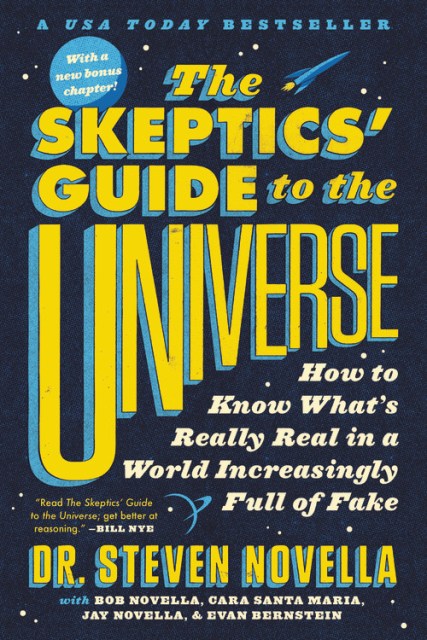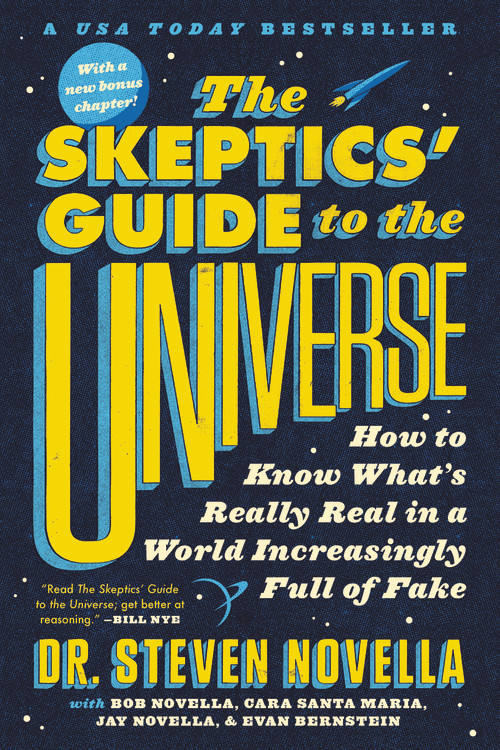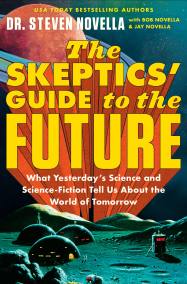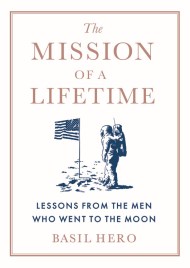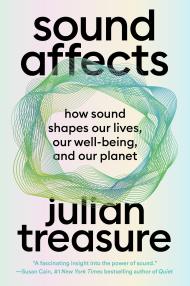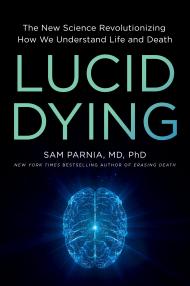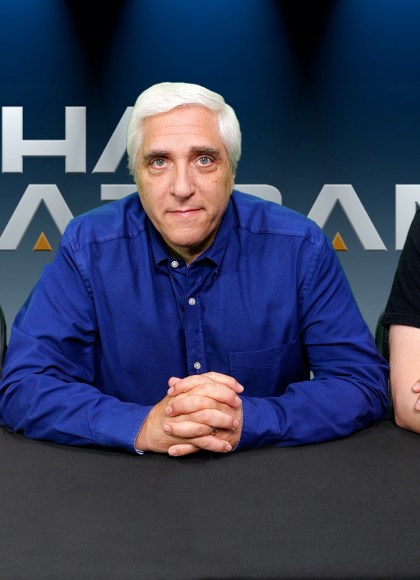By clicking “Accept,” you agree to the use of cookies and similar technologies on your device as set forth in our Cookie Policy and our Privacy Policy. Please note that certain cookies are essential for this website to function properly and do not require user consent to be deployed.
The Skeptics’ Guide to the Universe
How to Know What's Really Real in a World Increasingly Full of Fake
Contributors
With Bob Novella
With Cara Santa Maria
With Jay Novella
With Evan Bernstein
Formats and Prices
- On Sale
- Dec 3, 2019
- Page Count
- 528 pages
- Publisher
- Grand Central Publishing
- ISBN-13
- 9781538760529
Price
$21.99Price
$28.99 CADFormat
Format:
- Trade Paperback $21.99 $28.99 CAD
- Audiobook Download (Unabridged)
This item is a preorder. Your payment method will be charged immediately, and the product is expected to ship on or around December 3, 2019. This date is subject to change due to shipping delays beyond our control.
Buy from Other Retailers:
It is intimidating to realize that we live in a world overflowing with misinformation, bias, myths, deception, and flawed knowledge. There really are no ultimate authority figures-no one has the secret, and there is no place to look up the definitive answers to our questions (not even Google).
Luckily, The Skeptic’s Guide to the Universe is your map through this maze of modern life. Here Dr. Steven Novella-along with Bob Novella, Cara Santa Maria, Jay Novella, and Evan Bernstein-will explain the tenets of skeptical thinking and debunk some of the biggest scientific myths, fallacies, and conspiracy theories-from anti-vaccines to homeopathy, UFO sightings to N- rays. You’ll learn the difference between science and pseudoscience, essential critical thinking skills, ways to discuss conspiracy theories with that crazy co- worker of yours, and how to combat sloppy reasoning, bad arguments, and superstitious thinking.
So are you ready to join them on an epic scientific quest, one that has taken us from huddling in dark caves to setting foot on the moon? (Yes, we really did that.) DON’T PANIC! With The Skeptic’s Guide to the Universe, we can do this together.
“Thorough, informative, and enlightening, The Skeptic’s Guide to the Universe inoculates you against the frailties and shortcomings of human cognition. If this book does not become required reading for us all, we may well see modern civilization unravel before our eyes.” — Neil deGrasse Tyson
“In this age of real and fake information, your ability to reason, to think in scientifically skeptical fashion, is the most important skill you can have. Read The Skeptics’ Guide Universe; get better at reasoning. And if this claim about the importance of reason is wrong, The Skeptics’ Guide will help you figure that out, too.” — Bill Nye
Genre:
-
"Thorough, informative, and enlightening, The Skeptic's Guide to the Universe inoculates you against the frailties and shortcomings of human cognition. If this book does not become required reading for us all, we may well see modern civilization unravel before our eyes."Neil deGrasse Tyson, Astrophysicist, American Museum of Natural History
-
"In this age of real and fake information, your ability to reason, to think in scientifically skeptical fashion, is the most important skill you can have. Read The Skeptics' Guide Universe; get better at reasoning. And if this claim about the importance of reason is wrong, The Skeptics' Guide will help you figure that out, too."Bill Nye
-
"A lively, engaging, and very timely guide to navigating a world rife with misinformation and pseudoscience. This book will give you the tools to ferret out nonsense and confront your own biases-and hopefully change a few minds along the way."Jennifer Oullette, author of Me, Myself, and Why and The Calculus Diaries
-
"A fantastic compendium of skeptical thinking and the perfect primer for anyone who wants to separate fact from fiction."Richard Wiseman, Professor of the Public Understanding of Psychology at University of Hertfordshire and bestselling author of 59 Seconds
-
"In his 1995 book The Demon-Haunted World, the great Carl Sagan prophesied a descent into superstition and ignorance. Well, that world has arrived. Fortunately, Steve Novella and his co-authors are here to help us navigate it with critical thinking and scientifically-appropriate skepticism, along the way exposing the antiscience and pseudoscience so prevalent in our public discourse today, from confirmation bias to conspiracy theories, N-Rays to Nessie, the Face on Mars, to Flat-Eartherism."Michael Mann, Distinguished Professor, Penn State University and co-author of The Madhouse Effect: How Climate Change Denial is Threatening our Planet, Destroying our Politics, and Driving us Crazy
-
"A terrific book for anyone who wants a better understanding about the world around them and an essential guide to navigating modern life. The Skeptics' Guide to the Universe will help readers recognize pitfalls in reasoning, combat bad arguments and avoid superstitious thinking."Simon Singh, Skeptic & Author of Fermat's Enigma
-
"There are so many ways to be wrong, what we all need is a guidebook to being right. And here it is: The Skeptics' Guide to the Universe is an invaluable manual to avoiding all of the ways we can fool ourselves and be fooled by others. It's depressing to think of how many ways there are, but at least now we have no excuse for not being prepared."Sean Carroll, author of The Big Picture: On the Origins of Life, Meaning, and the Universe Itself
-
"Steve and the gang have done it again. The Skeptics' Guide to the Universe is the best and most popular podcast on science and skepticism out there (I am honored to have been their first guest!). And now this book is the best, soon to be the most popular, guide to what's really real, so far as we can tell."Massimo Pigliucci, K.D. Irani Professor of Philosophy at the City College of New York, author of Nonsense on Stilts: How to Tell Science from Bunk
-
"Using examples ranging from Monty Python to Monty Hall, The Skeptics Guide to the Universe offers the first ever page-turner that teaches you how to think clearly."Paul A. Offit, MD, author of Bad Advice: Or Why Celebrities, Politicians, and Activists Aren't Your Best Source of Health Information
-
"There's nothing more riveting, nor more frightening, than the economy-size ability of the citizenry to embrace unscientific explanations for puzzling events. We hardly blink when ordinary folk are seduced by easy-to-grasp--if wrong--explanations for autism or mysterious lights in the night sky. But we should be alarmed. The science may be pseudo, but the grievous consequences are real. Steve Novella and colleagues offer a fascinating collection of the many contemporary phenomena now ascribed to mysterious or even conspiratorial causes. They also point out the logical errors that are repeatedly made by those who claim that the truth is out there--and frequently too far out there! For those who want to know, not merely believe, this book is an essential read. It's also a great one."Seth Shostak, Senior Astronomer, SETI Institute
-
"A lighthearted, wide-ranging romp through pseudoscience, quackery, and nonsense of all kinds. Fun and fascinating, with an undercurrent of darker urgency-given the upsurge in bald faced lies and bizarro claims all around us, this book may be your best defense."Steven StrogatzProfessor of Mathematics, Cornell University and author of The Joy of x
-
"If everyone in the world were to read this book, we might just arrest humankind's depressing slide into truthlessness. Someone should put the Skeptics' Guide on the vaccination schedule."Tim Minchin
-
"At last! A user's guide to scientific skepticism written by some of the most prominent and influential Rogues in the Skeptical Community. From phantom Pompeii penis memories to the current fake news phenomenon, The Skeptics' Guide to the Universe reads like a dream; casual, occasionally irreverent, full of great anecdotes and humor but ultimately a well-researched and authoritative account of the vagaries of human folly and foolishness. What I particularly like is that it is neither smug nor condescending but rather, well-intentioned and genuinely urges the reader to recognize that it is in our nature to believe nonsense but equally that we should be vigilant. This is what we have been waiting for. I will be recommending this to my students as a comprehensive guide to developing critical thinking. "Bruce Hood, author of SuperSense, The Self Illusion, and Possessed
-
"Our lack of critical thinking skills and embarrassing scientific illiteracy are among the most critical issues of our time. We are drowning in a sea of myths, lies, deceptions, fakes and superstitions. We are inundated and surrounded by pseudoscience and illogic. We have lost our way. The timing couldn't be better for the publication of a brilliant new book, The Skeptics Guide to the Universe. It's a friendly, comprehensive, clear and direct guide to these pressing issues and guess what...it's a hell of a lot of fun to read."Dean Edell M.D., host of the Dr. Dean Edell Show and author of Eat Drink and Be Merry
-
"If there's one thing we all need in these confusing and stressful times, it is clear thinking and accurate appraisals of the information flooding our senses. Thankfully, this book gives to the reader precisely the tools needed to bring this about. The Skeptics Guide to the Universe is an essential resource for a lifetime of critical thinking and analysis."Michael Whelan, award-winning artist and author of The Art of Michael Whelan and Beyond Science Fiction
-
Steven Novella (Clinical Neurology/Yale Univ. School of Medicine), a founding fellow of the Institute for Science in Medicine and host and producer of the titular science and critical thinking podcast, pulls no punches in his attack on the misinformation, myths, and biases that surround us. Aided here by several writing associates, the author demonstrates his vast experience explaining the mechanisms of deception and the tactics used by pseudoscientists. Presented as "one giant inoculation against bad science, deception, and faulty thinking," the book succeeds superbly.Kirkus (starred review)
-
"Empowering and illuminating, this thinker's paradise is an antidote to spreading anti-scientific sentiments. Readers will return to its ideas again and again."Publisher's Weekly (starred review)
-
"This important addition to the literature of skepticism deserves shelf space beside the works of such notables as Michael Shermer, James Randi, Robert A. Baker, and Martin Gardner."Booklist
Newsletter Signup
By clicking ‘Sign Up,’ I acknowledge that I have read and agree to Hachette Book Group’s Privacy Policy and Terms of Use
